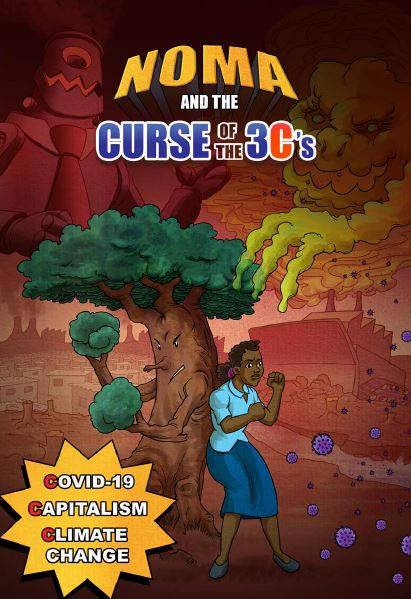By Mandy Moussoris and Dale T. McKinley
20 November 2020
First published in The Daily Maverick.
The telling of stories is a tried and tested way of bringing people together and engaging young minds. Using the medium of comics creates visual interest and allows for the visual representation of ideas, concepts and emotions in a straightforward yet profound way.
There’s a new superhero in South Africa! The International Labour, Research and Information Group (ILRIG) and the Environmental Monitoring Group (EMG) have developed, in Afrikaans, English and isiXhosa, a story about Noma the superhero to help everyone engage with and confront the curse of the three C’s – Capitalism, Covid-19 and Climate Change. It is called Noma and the Curse of the 3 C’s. It is the second of ILRIG’s comic book series (see and download the first comic book on gender-based violence here).
The intention behind the comic is to show how a rampantly destructive capitalism is fuelling (pardon the pun) global crises like the Covid-19 pandemic, but also how things are going to continue to worsen with the climate crisis. The comic also offers a way forward in responding to these threats, which entails the building of a movement and a reorganisation of society to put people and the natural environment before profit.
Never has there been a more important time for everyone in society to recognise the looming apocalypse that is the climate crisis and never a more real-life lesson to illustrate the kind of impacts we must expect than the Covid-19 pandemic. That the issues are interrelated and linked to the socioeconomic system of capitalism lays the foundation for an important message; but how do you convey this message in a way that we can all relate to?
The telling of stories is a tried and tested way of bringing us all together, of sharing ideas and concepts in ways that we identify with and can internalise easily. Using the medium of comics to tell stories adds further dimensions to the weaving of the tale, it creates visual interest and allows for the visual representation of ideas, concepts and emotions in a straightforward yet profound way. Cognitive psychology has long shown that visual explanations map thought more directly than words and are able to illustrate the ideas and emotions behind words in a very accessible way.
The medium also allows for a less formal approach to the language traditionally used by academics and “experts” in the field. While it is always possible to use simple language to convey ideas, not enough of this is being done. As a result, a large quantity of research and educational materials produced by NGOs, academics and others only speaks to a small audience.
Using more accessible language to convey often difficult and complex debates and ideas is made easier with the use of images, which can convey them through visual representation much more effectively. This is not new; it has long been used as a teaching technique in nursery schools, schools and universities. This is crucial, because otherwise the information produced around the major debates, issues and struggles of our time will be out of reach for most people.
Creating something that attempts to talk to as wide an audience as possible, in accessible language and that speaks to real problems, is imperative if we are to build a collective understanding of our current conditions and the possibilities of change.
For example, something that a mother who has to take care of children, do other domestic work and also work a full-time “regular” job can then read to her children or have her children read to her. Something that not only tells a story in which we see ourselves and understand our reality but that lays the foundation of a new way of seeing the world around us (however big or small) and the possibilities of new ways of being and changing that world.
The comic form – especially when dealing with serious social, economic and political issues – can also make reading and learning more fun. No doubt, this is something we can all use a lot more of right now.
Whatever your age and education and whatever your political affiliation, economic status and social views, we hope that a comic book like Noma and the Curse of the 3 C’s will educate and entertain.
(Download the comic here in English, Afrikaans, or isiXhosa)
